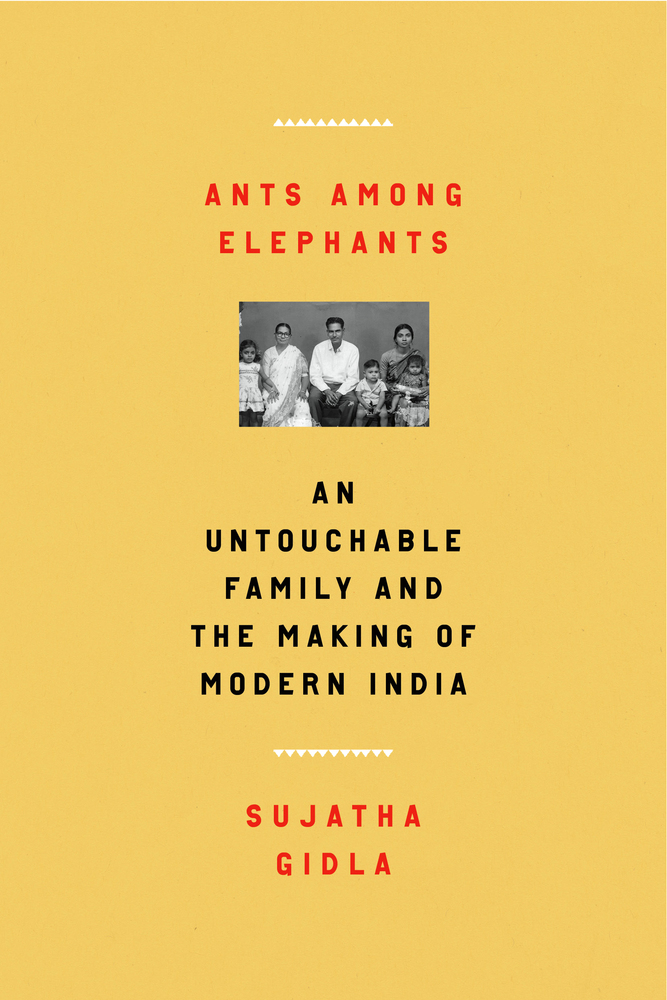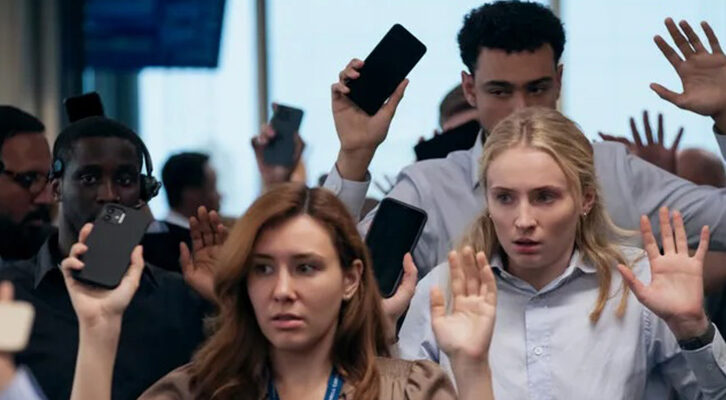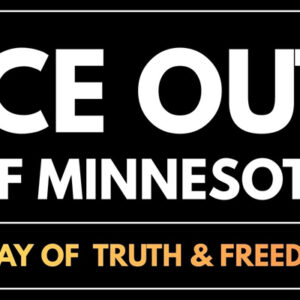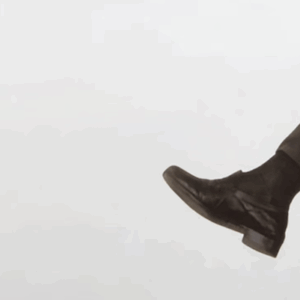
Growing Up As An Untouchable
Sujatha Gidla and the Story of Lower Caste Family
My stories, my family’s stories, were not stories in India. They were just life.
When I left and made new friends in a new country, only then did the things that happened to my family, the things we had done, become stories. Stories worth telling, stories worth writing down.
I was born in south India, in a town called Khazipet in the state of Andhra Pradesh.
I was born into a lower-middle-class family. My parents were college lecturers.
I was born an untouchable.
When people in this country ask me what it means to be an untouchable, I explain that caste is like racism against blacks here. But then they ask, “How does anyone know what your caste is?” They know caste isn’t visible, like skin color.
I explain it like this. In Indian villages and towns, everyone knows everyone else. Each caste has its own special role and its own place to live. The brahmins (who perform priestly functions), the potters, the blacksmiths, the carpenters, the washer people, and so on—they each have their own separate place to live within the village. The untouchables, whose special role—whose hereditary duty—is to labor in the fields of others or to do other work that Hindu society considers filthy, are not allowed to live in the village at all. They must live outside the boundaries of the village proper. They are not allowed to enter temples. Not allowed to come near sources of drinking water used by other castes. Not allowed to eat sitting next to a caste Hindu or to use the same utensils. There are thousands of other such restrictions and indignities that vary from place to place. Every day in an Indian newspaper you can read of an untouchable beaten or killed for wearing sandals, for riding a bicycle.
In your own town or village, everyone already knows your caste; there is no escaping it. But how do people know your caste when you go elsewhere, to a place where no one knows you? There they will ask you, “What caste are you?” You cannot avoid this question. And you cannot refuse to answer. By tradition, everyone has the right to know.
If you are educated like me, if you don’t seem like a typical untouchable, then you have a choice. You can tell the truth and be ostracized, ridiculed, harassed—even driven to suicide, as happens regularly in universities.
Or you can lie. If they don’t believe you, they will try to find out your true caste some other way. They may ask you certain questions: “Did your brother ride a horse at his wedding? Did his wife wear a red sari or a white sari? How does she wear her sari? Do you eat beef? Who is your family deity?” They may even seek the opinion of someone from your region.
If you get them to believe your lie, then of course you cannot tell them your stories, your family’s stories. You cannot tell them about your life. It would reveal your caste. Because your life is your caste, your caste is your life.
Whether they know the truth or not, your untouchable life is never something you can talk about.
It was like this for me in Punjab, in Delhi, in Bombay, in Bangalore, in Madras, in Warangal, in Kanpur, in Calcutta.
At 26, I came to America, where people know only skin color, not birth status. Some here love Indians and some hate them, but their feelings are not affected by caste. One time in a bar in Atlanta I told a guy I was untouchable, and he said, “Oh, but you’re so touchable.”
Only in talking to some friends I met here did I realize that my stories, my family’s stories, are not stories of shame.
*
No one informed me that I was untouchable. It is not the kind of thing that your mother would need to tell you. What I was told was that we were Christians.
Christians, untouchables—it came to the same thing. All Christians in India were untouchable, as far as I knew (though only a small minority of all untouchables are Christian).
I knew no Christian who did not turn servile in the presence of a Hindu.
I knew no Hindu who did not look right through a Christian man standing in front of him as if he did not exist.
I accepted this. No questions asked.
I saw the grown-ups in my family scrambling to their feet, straightening their clothes, and wringing their hands when a certain bowlegged, cross-eyed, drooly-mouthed Hindu man passed in front of us.
I saw our Hindu neighbors passing us by without even registering our presence.
Accepted. No questions asked.
I knew the cross-eyed, drooly-mouthed man was fucking my aunts (both of them), making children with them, but not marrying them because they were Christians.
I knew a Christian boy who was pushed in front of a train for falling in love with an uppercaste girl.
Christians are lowly. Hindus are superior. Christians are weak. Hindus are powerful.
I understood. I accepted. That was the natural way of things.
The questions started when I was fifteen and someone took me and my sister to see a movie. Then they came in a flood that would not stop for years. In a way, they still haven’t.
In the movie a rich girl falls in love with a poor boy. The girl’s powerful family intimidates the poor boy’s family into forcing him to stop seeing her. The girl, not knowing what her family has done, goes searching for the boy. When she can’t find him, she gives up and agrees to marry a nice, well-educated, wealthy man.
No surprises here for an Indian moviegoer. The shock came at the wedding scene. The heroine wears a white gown. Not a sari like a Hindu bride. A white, Western-style gown with a veil, like they wear at Christian weddings.
My blood froze. My brain went numb. I couldn’t breathe.
The rich girl was Christian! And I recalled that in the scene where the poor boy’s family was threatened, his father had on his chest the crossthread worn by all brahmin men.
This movie, in sheer defiance of the laws of nature, portrayed Christians as rich and powerful and—most amazing of all—scornful of brahmins, the highest caste of all.
It is simply not possible to convey what this meant to a fifteen-year-old untouchable Christian girl.
Were there really Christians like this?
Why had I never seen them?
Why had no one ever mentioned this before?
My questions found no outlet. It was too shameful to bring up the subject of our inferior status, even among my own folk. I never thought to ask anyone. I wouldn’t have known how to put the words together.
Four years later, at nineteen, I left home to enroll in a postgraduate program at the Regional Engineering College (REC) in Warangal. There were only fifteen RECs in the whole country. Students from other states and even other countries went there to study. That was the first time in my life I saw people from outside my home state of Andhra.
Being a small-town girl, I was afraid of betraying my curiosity about all the strange and modern things I saw at the college. I saw girls with short hair. I saw girls in sleeveless blouses. I even saw some girls wearing pants. Some wore lipstick and tweezed their eyebrows. I saw girls secretly smoking. I learned the concept of boyfriend-girlfriend. And of course all of these girls could speak English.
It was here that I first saw in real life what I had seen in that movie: Christians who looked down on even high-caste Hindus.
But what could I ask them? I was ashamed to bring up the subject. I finished my program without ever finding out what the difference was between them and me.
After Regional Engineering College I went to yet another citadel of engineering education. I went to Madras to attend the Indian Institute of Technology. IITs are the most elite, most cosmopolitan technical institutions in India, the Indian equivalents of MIT and Caltech. I was a research associate in the department of applied physics working on a project funded by the Indian Space Research Organisation.
In the ladies’ hostel, my eyes were dazzled by the sight of the other girls. They were all so beautiful, rich, happy, charming, high-class. I felt as if I were surrounded by movie heroines, but with brains. And in the hostel I saw many more of those elusive superior Christians.
One thing I noticed quickly: they all came from the southern state of Kerala. That movie I had seen, I found out later, had been made in Malayalam, the language spoken in Kerala, and dubbed into my own native language of Telugu.
These Kerala Christian girls lived in the same wing of the hostel as me.
Jessie’s beauty was otherworldly. She was always flanked by two brahmin girls, her loyal sidekicks.
Supriya Abraham, when she descended to the ground floor to go to the mess, was like a star from the sky deigning to visit the earth.
The brahmin boys who fawned over these Christian girls would look at me in disgust. In my town, Christian girls were called crows, pigs, scavengers. One boy in my neighborhood used to call me and my sister “shit lilies.”
I wanted to make friends with these Keralites. Wasn’t I a Christian like them? But they shunned me just as any Hindu would. I was deeply hurt, more deeply than when it happened with the Hindus.
But I was determined to find out why I was different. Jessie was kind, one of the only girls who would talk to me. Her room and my room were on the same floor. I tagged along with her to church even though by then I already didn’t give a damn about God.
I asked to see photos of Jessie’s family. They were obviously wealthy. I started probing, asking questions. Jessie explained, “We are brahmins.” She told me her family came from a brahmin caste in Kerala called Nambudiris. Nambudiris are so high in rank that they look down on all other brahmins.
“Why did you become Christian?”
She explained that among the Nambudiris, in ancient times, the eldest son inherited all the property, and only he was allowed to marry. The rest of the sons inherited nothing and had to find lower-caste mistresses or remain celibate.
When Jesus’ disciple Thomas traveled to Kerala, some disgruntled younger Nambudiri sons left Hinduism altogether and were baptized by Thomas.
“So we are brahmin Christians,” Jessie told me.
But I refused to believe her. Is that all it took? Some Christians decide to claim brahmin heritage and everyone believes it? It was too far-fetched. When I came to America, I met more Kerala Christians. By this time I was brazen. Every time I met one, my first question would be “How come you have high social status whereas we don’t?” They all told me the same story: they were brahmins converted by Saint Thomas. “When?”
“Fifty-two AD.”
So what is the relation between religion and caste? Between caste and social status? Between social status and wealth? Between wealth and caste? I thought about these things incessantly.
I decided to find out how my family became Christians. I called my mother. That was when she began to tell me the story of our ancestors.
*
My mother and her eldest brother have facility with language, insight into people and social conditions. He became a famous poet (under the pen name Shivasagar), while she could never get herself organized to sit down and write. Both have the ability to captivate. And both had much to tell about the things they had seen and participated in. When I came along wanting to know more, they were overjoyed.
Growing up, I had heard my mother reminiscing about her beloved eldest brother, who had disappeared years ago and gone underground.
My uncle K.G. Satyamurthy, who was known as SM, was a principal founder in the early 1970s of a Maoist guerrilla group recently declared by the government to be the single greatest threat to India’s security.
When I was eight years old my mother took me and my brother and sister to a movie about a young man who had organized a rebellion against the British to stop them from encroaching on the forests and displacing the poor tribals (those living in primitive tribes in the vast forests of the country, as more than eight percent of the people in India still do today). On the way my mother told me, “It is a movie about a man much like your uncle.”
Another time she took us to a movie featuring a song that took its lyrics from one of my uncle’s poems.
As I grew older, I kept asking to hear more about this mysterious man. And my mother would tell me stories about his cleverness, his charm, his beauty, his ardor, and his cunning.
When I first started looking into the story of my ancestors, I knew I had to get in touch with SM. He was still in hiding but was now at least reachable. Being older than my mother and more in touch with earlier generations, he knew even more about their history. He told me much more than I could fit into this book, fascinating stories that I hope to present someday. And naturally he had his own story to tell.
By the time I contacted SM, he was a fallen angel. He liked the idea of someone’s writing about his glorious bygone years.
The stories he told were full of detail and colorful expressions in our native language. I did not want to lose anything, so I bought a little tape recorder that I could connect to a phone line.
SM loved telling me these stories. But more than anything else, SM longed to lead the masses in another struggle. Every time some young admirers would come to him saying, “Sir, we want to start a new party. Would you be the leader?” he would run off with them to a jungle somewhere, inaccessible by phone. This happened three, four times. It was frustrating to track him down. Each time it would take weeks or months before I could get back in touch and persuade him to give me some time on the phone.
So I asked him if he would promise to spend time with me if I came to see him in person. He agreed.
I flew to India along with my closest friend, equipped with my recorder and microphone, a hundred blank tape cassettes, and a stack of notebooks. Traveling with my mother, we took a train to Vizag, a city in Andhra, where we met SM and the young man who was acting as his assistant. Ever since SM turned 20, he had never been able to live without a personal aide to carry his things, clip his nails, and so on. He didn’t even know how to shave himself.
There he was, waiting for us, small and frail with copper skin, silver curls on his head, high cheekbones, and big hooded eyes. His arms and legs were sticklike and his belly rounded, like a famine victim’s, as my mother had always described him.
We booked adjacent rooms at a hotel. Each morning for three weeks my friend and I woke up, washed, changed, had breakfast, and carried our equipment over to SM’s suite.
He would be ready and waiting for us, lying in bed dressed in a neatly pressed shirt and pants. His assistant sat by the bed with a pen in his hand. I would clip the mic to SM’s shirt collar and he would begin. It was serious, dead serious, like Lenin dictating the party program to his comrades.
He had arrived with his assistant carrying all the books and documents SM needed as supporting material. If he was telling me such and such a thing happened under British rule, he had a book to prove it. If I ever asked him something he wasn’t sure of or lacked evidence to back up, he would ask the young man to make a note. Sometimes my mother would jump in and say something.
He talked for four or five hours at a stretch. Just to keep track of what he was saying, jot notes, and ask for clarifications was exhausting. It must have been five times more strenuous for him.
At the end of the three weeks he gave me a surprise parting gift. It happened that SM was working on his autobiography. He gave me copies of all the written material, telling me, “Use it freely.”
I came home with a suitcase full of papers and books, a list of more books to look up, and all the tapes and notes.
There was so much material. I jumped in headlong. But as I worked, I always needed more details. Get SM on the phone. Again the same problem: he was off somewhere trying to start a new party.
On a second trip I visited all the places where my family’s story had taken place. I spoke to people my subjects had known, including some relatives living in remote villages I had never before seen. They were all excited to take part. One man even showed me a small book he had written about his village. I used material from these interviews as well, and the people I met corroborated the stories that my mother and uncle had told me.
Of all the people I spoke to, only my mother understood the kind of book I was writing. She knew what I needed to hear about and would tell me anything I wanted to know.
SM, when asked about himself, would only talk about his political life, his life in the movement. I would try asking what it was like for him when his first child was born. He did not care to answer. When I asked how it felt to be separated from his children when he went underground, he told me he did not remember. That may have been true. He was like that. The movement was his life.
*
The most frustrating person to interview turned out to be my mother’s other brother, Carey. Carey was director of physical education at Kakatiya Medical College in Warangal, in northwest Andhra. When I went to Warangal to speak to him, I found him full drunk. He was slurring his words so badly I could not understand a thing. And his niece was grinding lentils in the next room, and a few feet away the maid was slapping wet clothes on a stone slab. In the hot afternoon air the noise of the grinding and the washing was maddening. Unlike my mother and SM, these people had no idea of the value of what I was trying to do. I consoled myself with the thought that I could play the tapes back at slow speed and try to figure out what Carey was telling me.
Back in New York, I listened to my tapes and could not make out a single word. I wanted to strangle Carey with both my hands.
He agreed to talk to me on the phone, but he was too self-conscious and always too drunk to be of any use. Carey was in some ways the most fascinating of the three siblings. He never knew what fear felt like. He was utterly immune to corruption. But sadly he was the least articulate.
And many things he was unwilling to discuss. When I tried to ask about his famous sexual conquests, he would scold me: “Why are you doing this? Why are you writing this book? Why are you dredging up this ugly stuff?” I tried to tell him that in America sexuality is not something to be ashamed of. He couldn’t believe it.
I know it wasn’t easy for him to look back on many things. He would say, “Abba! What degrading poverty it was.” And he was bitter. Many times he criticized my mother and SM. He felt he was the only one who had lived up to the ideals of their youth.
I came up with an idea. I should try catching him early in the morning before he got too drunk. Because of the time difference, this meant I had to stay up late and go to work in the morning with little sleep.
But before I could get anywhere with him, Carey died. He may have been killed. No one in his family would tell my mother anything, probably because they didn’t want to have to deal with an investigation.
Compiling the material for this book has been a race against death. The people I needed to speak to were old, many of them also impoverished and in poor health. Getting everything I needed from them before it was too late became an obsession of mine. Nancharayya, David John, Rani, Graceamma, Manikya Rao, Lilly Flora, Carey—they all died before I had a chance to finish talking to them. Every time my mother would tell me the latest news, I was inconsolable.
My mother thinks I’ve developed an attachment to the people I am writing about. She thinks I am grieving their loss. But what I am really grieving is the material that is lost forever.
When these deaths come, they traumatize me. I cannot speak or eat or sleep. I cannot stand or sit up. When Nallamma, a peripheral figure in the story, died soon after I spoke to her, it nearly killed me. No one could understand. When friends, not knowing how I felt, tried to coax me out of bed, I turned violent.
Another time, when I heard Carey’s high school friend Pulla Reddy had had a stroke and lost his ability to speak, I was speechless. I sent a check for $200 so he could get physical therapy and some other care. I thought of all the things for him to lose the use of, why should it be his tongue, the one part that mattered most for my purposes. I didn’t need him to dance, I didn’t need him to lift anything. As I saw it, I had been cursed most cruelly. In the end he could speak a little, but I had no heart to hear him struggle. When he died, the news was kept from me.
And then my father’s aunt Dyva Vathi. She fell. Lost her memory. Her memory!
Finally I closed my ears to such news. My mother, out of concern for my feelings, has told all the relatives to never mention a word to me about death or illness.
I know SM had a stroke a couple of years ago, is blind in one eye, cannot move. I was relieved when my mother told me he had not lost his speech. I tried to call him. But the daughters who took over his care had cut off his phone privileges.
So I went to see him in person. He could speak, but I could not understand anything he said because all his teeth had fallen out.
The small stroke should not have incapacitated him so much. His daughters told me they had to wait three days to take him to a doctor. Three days? I didn’t understand. They explained they wanted to take him to the doctor who would see him for free, an admirer of his, who was out of town. So they waited.
Sure enough, his memory was affected. Nothing was left for me there. One of his daughters has removed the TV from his room and prohibited newspapers and visitors. In those conditions he won’t last long. I know I am never going to see him again.
I stopped inquiring about his health, his condition. I don’t want to know more. I avoid looking at Telugu news online for fear of coming upon an obituary.
As of this writing, I do not know if this book’s principal subject is alive or dead.
__________________________________
Excerpted from Ants Among Elephants: An Untouchable Family and the Making of Modern India by Sujatha Gidla. Published by Farrar, Straus and Giroux. Copyright © 2017 by Sujatha Gidla. All rights reserved.
Sujatha Gidla
Sujatha Gidla was born an untouchable in Andhra Pradesh, India. She studied physics at the Regional Engineering College, Warangal. Her writing has appeared in The Oxford India Anthology of Telugu Dalit Writing. She lives in New York and works as a conductor on the subway.




















